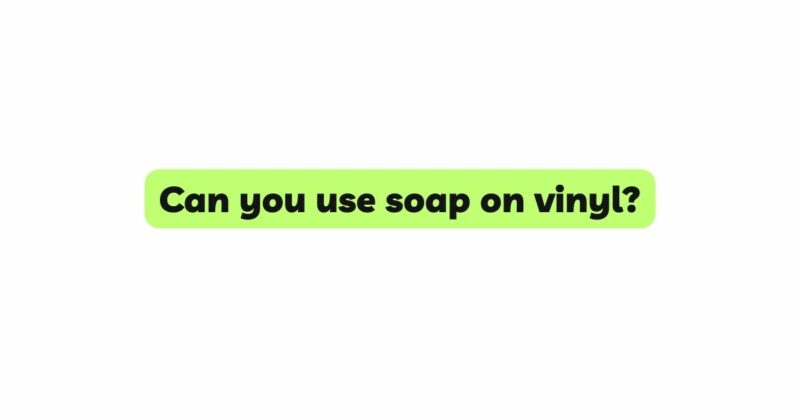Vinyl records have made a remarkable resurgence in recent years, captivating audiophiles and music enthusiasts with their warm, analog sound. To preserve their pristine audio quality and extend their lifespan, proper cleaning and maintenance are essential. While traditional cleaning methods typically involve specialized vinyl cleaning solutions, there is often confusion about whether soap can be safely used on vinyl. In this article, we will explore the dos and don’ts of vinyl cleaning, including the use of soap, to help you keep your precious vinyl collection in optimal condition.
Understanding Vinyl Records
Before delving into vinyl cleaning techniques, it’s crucial to understand the composition of vinyl records. Vinyl records are made from polyvinyl chloride (PVC), a type of plastic known for its durability and flexibility. The surface of a vinyl record contains grooves that hold the audio information, and any contaminants or debris on the surface can negatively affect sound quality and tracking accuracy.
Why Cleaning Vinyl Records Matters
Dust, fingerprints, oils, and other debris can accumulate on vinyl records over time, causing pops, clicks, and distortion during playback. These imperfections can significantly diminish the audio experience and potentially damage the stylus or needle of your turntable. Cleaning your vinyl records regularly not only ensures a better listening experience but also preserves the longevity of your cherished collection.
The Debate: Using Soap on Vinyl Records
The topic of using soap on vinyl records has sparked numerous debates among vinyl enthusiasts. While some argue that gentle soap solutions can be safe and effective for cleaning, others believe that any contact with soap or detergents could harm the delicate grooves of the record. Let’s explore both sides of the argument to reach a definitive conclusion.
The Case For Using Soap:
- Mild Soap Solutions: Advocates of using soap on vinyl suggest using mild solutions with no harsh chemicals. These solutions are believed to be gentle enough not to damage the vinyl surface.
- Dirt and Oil Removal: Soap can help break down and remove stubborn dirt, oils, and contaminants that may not be effectively cleaned with just water or specialized vinyl cleaning solutions.
- Cost-Effective: Soap is readily available in most households, making it a cost-effective alternative to commercial vinyl cleaning products.
The Case Against Using Soap:
- Residue Buildup: Even mild soap solutions can leave residue on vinyl records, which could attract dust and debris, exacerbating the problem over time.
- Potential Damage: Soap, especially when used inappropriately, can leave fine particles behind, settling into the grooves and causing surface noise during playback.
- Safe Alternatives: There are plenty of safe and proven vinyl cleaning solutions designed specifically for records, ensuring minimal risk of damage.
Recommended Vinyl Cleaning Methods
- Dry Cleaning
Before resorting to wet cleaning methods, try dry cleaning your vinyl records to remove surface dust and debris. Here’s a step-by-step guide:
- Use an anti-static brush or a carbon fiber brush designed for vinyl records.
- Gently brush the surface of the record in a circular motion, starting from the center and moving outward.
- Wet Cleaning
If dry cleaning doesn’t suffice, wet cleaning can be effective for more thorough cleaning. However, exercise caution when using any liquid on vinyl records. Follow these steps:
- Prepare a vinyl cleaning solution: If you choose to use a commercial vinyl cleaning solution, ensure it is specifically formulated for vinyl records. Alternatively, you can make your own solution by mixing distilled water with a few drops of isopropyl alcohol or a gentle dishwashing soap.
- Apply the solution: Use a soft, lint-free microfiber cloth or a vinyl record cleaning brush to apply the cleaning solution to the record’s surface. Ensure the record lies flat during the cleaning process.
- Gently clean the record: With gentle circular motions, clean the record’s surface, moving from the center to the outer edge. Avoid pressing too hard or applying excessive force.
- Rinse and dry: After cleaning, rinse the record with distilled water to remove any remaining cleaning solution. Pat the record dry with a clean, dry microfiber cloth.
Conclusion
In conclusion, while the debate surrounding the use of soap on vinyl records persists, the consensus among vinyl enthusiasts and experts leans towards using purpose-built vinyl cleaning solutions or dry cleaning methods to ensure the safety and longevity of your precious records. Whether you’re a seasoned audiophile or a casual music lover, taking proper care of your vinyl collection will reward you with countless hours of pristine audio enjoyment. Remember, regular cleaning and maintenance are key to preserving the integrity of your cherished vinyl records, ensuring they stand the test of time and bring joy for generations to come.


